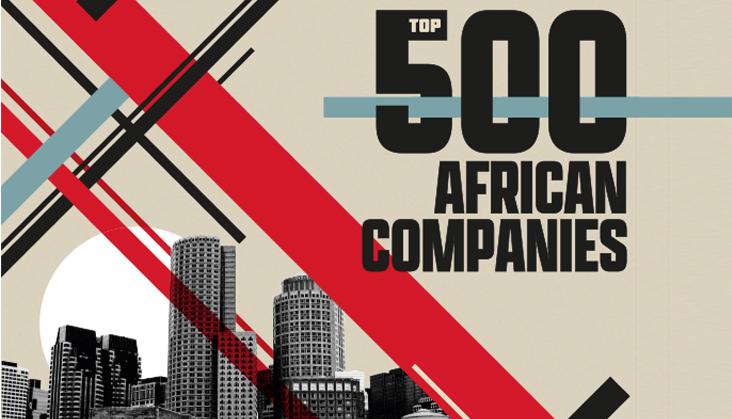Africa-Press – Lesotho. After the damage caused by the Covid-19 pandemic in 2020, the financial year 2021 will undoubtedly be a period of significant rebound for most African companies.
This is evidenced by the turnover of the Algerian giant Sonatrach (#1), which in 2021 soared by 70%. Meanwhile, our latest edition of the Top 500 Companies ranking, which focuses on the performance of companies in their financial year 2020, was marked by a depression.
The cumulative turnover – $590bn – of this exclusive ranking by The Africa Report represents a decline of 4.8%. In absolute terms, we have to go back to 2016 to find a lower figure, namely $569bn. At that time, there were currency crises in Egypt, Nigeria and South Africa.
As for the peak of activity in 2012 – when the 500 companies in the ranking took in a total turnover of $757bn – it will be many years before this can be matched, and even more so in a period of international tensions created by the conflict in Ukraine.
The drop in activity in this ranking illustrates the impact on Africa of the Covid-19 pandemic. The continent fared better than some other places. For example, the cumulative turnover of the CAC40 companies in France plunged over the same period by 14.7%, according to professional services firm EY.
World Trade Organisation director-general Ngozi Okonjo-Iweala tells The Africa Report: “Africa has lost about a decade or more of growth because of this pandemic, so the continent has been hit really hard; and, even though the IMF projects a rebound, it’s actually much lower for the continent than for other areas.
” She says: “There are two determinants of this that we found [.
.
.
]: the fiscal space within countries to be able to fight the pandemic, to be able to stimulate demand, stimulate their economies, provide liquidity for their enterprises and access to vaccines.
” In Africa, almost all economies felt the effects of the pandemic.
The crisis has had a relatively small impact on the health of the population, but prevention and containment measures had, especially in the first half of 2020, a depressive effect on consumption and investment, not to mention the freezing, for a time, of logistics networks.
“From March 2020 onwards, suddenly everything in the business world came to a standstill.
The recovery from the summer was slow even if companies were able to adapt quickly enough,” says the head of an investment fund operating in West and North Africa. Crude prices cause freefall Continental GDP fell by 2.1% in 2020, according to the African Development Bank (AfDB).
The bank declared this ‘the worst recession in 50 years’, a recession that followed the 3.3% growth in 2019, but preceded the welcome rebound in 2021, which is estimated at 3.4%.
The regions of the continent suffered from the effects of the pandemic to varying degrees. In 2020, East Africa fared the best with 0.7% GDP growth. In contrast, Southern Africa’s GDP plunged by 7%.
The other regions posted lower levels of growth: -1.1% for North Africa, -1.5% for West Africa and -2.7% for Central Africa. The crisis was particularly severe for certain sectors: air transport, tourism, automobiles, and, above all, energy.
At $42.3 per barrel, the average annual price of Brent crude fell by 33.9% in 2020, according to World Bank data. This is illustrated, for example, by the fall in our ranking of Angola’s Sonangol (#20): its oil sales fell by 25% over the period.
The state-owned group, led by Sebastião Gaspar Martins, has postponed its plans for a partial privatisation and a stock-market flotation, which are still on the table.
The plunge was even more spectacular for Total Gabon (#275), but the fall was temporary. The company doubled its turnover in 2021, thanks largely to the spectacular rebound of the price of Brent crude.
The price of non-precious metals, which are essential for the economies of countries, such as Guinea, Mauritania and the DRC, yo-yoed throughout 2020.
While aluminium fell by an annual average of 5% in 2020, according to World Bank data, other mineral prices, such as those of copper (2.7%) and iron ore (16%), rose due to supply-chain disruptions in Australia and Brazil.
This context benefited the Société Nationale Industrielle et Minière (SNIM, #108), the iron-ore heavyweight in Mauritania, which rose 44 places. In the midst of the pandemic, its turnover jumped by almost 40% and its profits doubled.
Gold played its role as a safe haven. Its average price jumped by more than 27% in 2020, benefiting groups, such as South Africa’s Sibanye Gold (#9), which entered our Top 10 after a record year.
In a period where there were many logistical problems and fears about supplies, agricultural-product prices almost all rose in 2020, and commodity purchases have remained high.
This is shown, for example, by the resilience of the Moroccan sugar company Cosumar (#137), which jumped 21 places after recording a sales rise of 5.1% in dirham terms.
Dangote Sugar Refinery (#226) is up 63 places. Whether or not they were previously in difficulty, airlines have paid a very heavy price for the Covid-19 crisis.
Top African air transporter Ethiopian Airlines (#43) dropped 10 spots, while Kenya Airways (#254) dropped 142 places. Conversely, companies in traditionally more resilient sectors, such as telecoms, rose in the ranking.
This is shown by the progress of Sonatel (#59, up 15 places) and most of the other Orange subsidiaries, as well as those of MTN Group (#4). Vodacom Group (#12) remains in the same place as last year. Telecom Egypt (#67) moved up 21 places. “Covid-19 accelerated the digital-transformation leapfrog.
In most of our markets we saw a 300% rise in the data throughput in our networks,” says Hardy Pemhiwa, the chief executive of Cassava Technologies, the holding company of Liquid Intelligent Technologies (#167), which runs one of Africa’s largest networks of fibre-optic cables.
The Top 15 Companies continue to weigh heavily on the overall ranking (27.1% of total revenue, compared with 28.4% last year) with, as always, a strong representation of South African companies (11 versus 12 last year).
Some changes are notable in this Top 15. The Moroccan phosphates and fertilisers giant OCP Group (#15) is back in the elite after rising four places, thanks to a year with turnover up by 4% in dirhams.
On the other hand, the South African fuel distributor Engen Petroleum (#28), a subsidiary of the Malaysian corporation Petronas, dropped 14 places and left the Top 15, illustrating the shock suffered by the economy of the country in which it has its headquarters. Within the Top 15, we also note the return of the Nigerian National Petroleum Corporation (NNPC, #6).
The Nigerian oil company recorded a 19.8% drop in revenue in naira terms in 2020, but it is notable that the state-owned group has started publishing consolidated accounts again after several years of total financial obscurity that had taken it out of our ranking.
The NNPC has thus reaffirmed its position as the regional champion in West Africa. On the other hand, another Nigerian oil company, Oando, is no longer included in the Top 500, as it has not published consolidated accounts for several years due to governance problems.
In this edition, only one region saw its relative weight drop in terms of cumulative revenue. This was North Africa (down from 28.4% to 25.6% of the total), mainly due to the weakness of Algeria.
The cumulative activity of this country fell from 10.1% to 6.9%, due to the drop in hydrocarbon prices. The weight of West African groups increased by 2.5% to 12.7%, due in particular to the return of the NNPC.
Central and East Africa remained at almost unchanged levels of 2.2% and 3.7%, respectively. In terms of distribution by country, South Africa still carries an overwhelming weight.
The country presided over by Cyril Ramaphosa counts for 51.7% of the total turnover of the ranking and 154 companies out of 500. Next in line, but following far behind, are Egypt (8.8% of turnover and 50 companies) and Morocco (7.7% and 56 companies).
For the first time, Morocco moved ahead of Algeria (6.9% with 14 companies) in terms of weighting in the ranking, due to Sonatrach’s decline in activity.
Nigeria (6.5% of turnover and 29 companies) completes the top five countries. Côte d’Ivoire (2% of total revenue and 27 companies) is for the first time ranked sixth in the Top 500 in terms of revenue.
This is despite the absence of the Société Ivoirienne de Raffinage, traditionally the country’s leading company, due to the lack of available data for 2020.
Finally, in terms of profitability, we have up-to-date results for 321 companies in this ranking, representing turnover of $446bn. All of these companies taken together (including the 88 of them with losses) had a profit and loss balance of $13.5bn and an average net margin of 3%.
This compares to an average profitability of 5.1% in the previous edition and 7.3% in the one before that. Unsurprisingly, the business crisis of 2020 was also a profit crisis.
The prize for the biggest loss went to Sasol (#3), with a loss of more than $6.2bn, followed by Sonangol at $3.5bn. The 88 companies in the red suffered a total loss of $22.9bn .
As for the 233 companies that were able to remain in the black, they generated a profit of $36.4bn on sales of $291bn, representing a net margin of 12.5%.
Except for Naspers (#16), where the profit was linked to asset transfers, the trophy for the largest profit in absolute terms went to South Africa’s Sibanye Gold, at $2.1bn. In an uncertain world, the yellow metal remains a safe bet.
For More News And Analysis About Lesotho Follow Africa-Press






